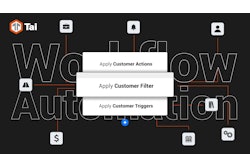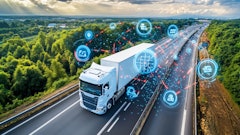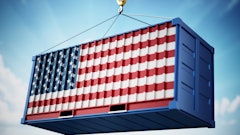
Natasha Martinez serves as head of fleet success for BeyondTrucks, a position she’s held since 2020. She first helped develop the company's pilot fleet operations, which were destined to create a digital twin and automate significant portions of the operation. As BeyondTrucks began offering its in-house technology to other fleets, she used her experience to become head of fleet success, where she led the transformation of dozens of fleets with the BeyondTrucks platform. At BeyondTrucks, Martinez has deployed technology across fleets; mentored clients, their leadership, and team members from driver to dispatcher in these deeply transformative technology journeys; and is redefining what “workforce development” means in today’s AI era.
Martinez excels at developing, retraining, and growing workforce talent while driving technological innovation. She was responsible for the opening of a new distribution center in Austin, Texas, in order to support Applied Materials. She also consolidated three distribution centers in Silicon Valley, resulting in improved service levels and reduced expenses. And, she implemented Lean Six Sigma structure in all manufacturing facilities and developed quality processes and audits to achieve ISO certifications. She maintains full oversight of strategic planning and tactical execution, and multi-facility oversight; balanced delivery schedules and reduced perishable operations billing by one day, equating to $1.3 million in annual savings; relocated perishable commodities into new Dallas operation, closer to Northern Texas customer base, resulting in $1.6 million in annual savings; managed and implemented new hire driver orientation, onboarding, and safe driver recognition programs; and was responsible for business process mapping activities and training deployment for warehousing operations, focused on functions, including receiving, putaway, selection, replenishment, loading, auditing, and reclamation.
Martinez began her career at Suntron in 1997 as a warehouse supervisor, where she quickly advanced to warehouse manager and then senior manager of warehousing and logistics by 1999. In 2004, she joined Grocers Supply Company (later C&S Wholesale Grocers), where she spent 13 years, starting out as warehouse operations manager, and ultimately rising to become senior director of transportation and logistics. Her career continued to grow when she moved to UNFI/Supervalu in 2017 as corporate VP, transportation, later becoming national VP of transportation. Initially focused on warehousing operations and driver management, Martinez soon advanced to national leadership positions overseeing private fleets for some of the country's largest grocers.
Her foundational work with truck drivers, dispatchers, accounting, and payroll clerks sets an example of how transformation can prioritize people, productivity, collaboration, and human capabilities. Her approach is human-centric and workforce-centric rather than technology-centric. She’s elevated human workers from mechanical data entry to strategic roles; created systems where automation empowers human judgment; restored control to operators; and helps establish a framework to measure how technology supports human capabilities.
Martinez was named the overall winner of the Workforce Innovator category for this year’s Women in Supply award, presented by Food Logistics and Supply & Demand Chain Executive, and sponsored by Let’s Talk Supply Chain and Blended Pledge program.
Marina Mayer, editor-in-chief of Food Logistics and Supply & Demand Chain Executive and co-founder of the Women in Supply Chain Forum, sat down with Martinez to discuss digital transformation in transportation and the importance of maintaining a diverse supply chain background.
Food Logistics and Supply & Demand Chain Executive: Let's first talk about you. Tell me a little bit about yourself and your journey to get to this current stage in your career?
Natasha Martinez: My journey began in 1997 when I started as a data entry clerk in a warehouse for a manufacturing company. From Day 1, I wanted to learn everything and eventually be in charge of it all. I was curious about every aspect of the operation, so much so that I convinced the warehouse team to teach me how to drive a forklift after hours.
What really shaped my leadership philosophy early on was watching our company president, who knew everyone's name. He became an example for me of how leadership should be personal and connected to the people doing the work.
I was promoted several times within the receiving and shipping departments. Shipping was particularly fascinating to me because I realized that moving a box within four walls was easy but moving it in the real world was much more complex. I had great leaders whom I worked for during this time, and they taught me a great deal and allowed me to continue growing. I eventually managed warehousing, shipping, and receiving, and earned my Six Sigma Green Belt during this time.
My career transitioned to the grocery segment with Grocers Supply Company (GSC). I started in warehousing but became intrigued by the truck drivers who came back from their deliveries. To gain insight into what was happening outside our four walls, I started doing ridealongs to see the real challenges they faced. These experiences prompted me to develop processes for drivers, establish SOPs for both warehousing and drivers, and implement exception management procedures.
My need to figure things out didn't stop there. When I was asked to manage the quality control department, my office moved next to dispatch, which gave me the opportunity to engage with dispatchers and learn their routines and work practices. Not only did I learn the details of their jobs, but working with a department of much older employees, who were all men, was also a chance to further develop my leadership and communication skills. Because of my initiatives with dispatchers and drivers, I was promoted to transportation manager, which included managing the dispatching team.
From there, I learned the logic of routing trucks and was given the additional responsibility of managing the routing department. My commitment to taking positive action continued even when breakdowns occurred. I would ask the fleet manager to explain the repairs or ask the safety manager what the driver could have done differently to prevent the issue. Over time, I was also asked to oversee the fleet maintenance department. The senior transportation manager had announced his retirement. I had been shadowing him for a long time. Senior management didn’t initially select me, but they soon realized I was the perfect person for the role. By my early thirties, I was managing all of transportation, safety, and maintenance for 350 drivers.
When C&S Wholesale Grocers purchased the wholesale and distribution portion of GSC, C&S fast-tracked me to corporate with a promotion to senior director by the age of 36-37. With management changes at Supervalu, the corporate VP asked me to join the team at a regional level. After my interview with the CEO, the company created a new position, corporate VP of transportation, in which I managed all aspects of transportation for 30 terminals, including routing, business analysis, fleet maintenance, and safety, as well as worked on various acquisitions.
After Supervalu was acquired by UNFI, I transitioned to VP of outbound transportation for 60 terminals. Most recently, I joined BeyondTrucks as head of fleet success, where I'm helping fleets navigate digital transformation and AI implementation.
Food Logistics and Supply & Demand Chain Executive: Your journey started in warehousing operations and driver management, and then advanced to national leadership positions overseeing private fleets for some of the country's largest grocers. Walk us through the benefits of such a diverse supply chain background.
Martinez: Having done every role in the supply chain gives me something invaluable: trust. When I walk into a room with drivers, dispatchers, warehouse workers, or C-suite executives, I can speak their language because I've literally done their job. This isn't theoretical knowledge for me—it's lived experience.
This background has made me deeply empathetic. When I'm working with someone, I'm constantly thinking about their job from their perspective. I ask myself, "How does this person learn? How do they experience the world? If this were me in their position, what would I need?" This empathy is crucial when you're implementing new technology or driving organizational change.
It also means I understand the interconnectedness of everything in the supply chain. When you've moved boxes in a warehouse, driven routes, managed dispatchers, and handled fleet maintenance, you see how every decision ripples through the entire operation. You can't optimize one part without understanding its impact on all the others.
Most importantly, my diverse background has taught me that every person in the supply chain brings valuable knowledge and perspective. The driver who's been on the road for 20 years knows things about customer relationships and route efficiency that you can't learn from a spreadsheet. The warehouse worker, who has been there for a decade, understands inventory flow in ways that data alone can't capture.
Food Logistics and Supply & Demand Chain Executive: You also spearheaded the complete digital transformation of Modern Transportation, a dry-bulk fleet. Tell us more.
Martinez: When I first visited Modern Transportation's terminals, I thought I knew everything about fleet operations. However, I quickly realized that I was personally about to be transformed by this experience. Each terminal visit revealed new complexities and challenges I hadn't encountered before.
Modern Transportation was operating with an 18-year-old legacy system across 22 terminals with 500 employees. The company was struggling to attract young talent while also getting their experienced workforce to adopt more productive tools. I recognized that this wasn't just about updating software—it was about preparing this workforce for a transformation that's coming to the work in our industry: AI.
I began by analyzing the daily workflows of all employees across their terminals and headquarters. I worked closely with drivers, dispatchers, and back-office staff to understand their pain points and daily challenges. What I discovered was that modernizing their technology stack wasn't just about efficiency—it was about creating a bridge between their experienced workforce and the next generation of workers.
The real transformation was in the workforce development. I led all training sessions for key personnel before the system transition. My vision was to co-create with them what would make everyone's job easier. When people feel passionate about a vision and see how it benefits them directly, they get excited about change rather than resistant to it.
The project involved meticulous data migration, workflow redesign, and system configuration; however, it was the human element that ultimately made it successful. Today, BeyondTrucks serves as their central platform for digital collaboration and automation, resulting in improved productivity, better decision-making, and increased satisfaction with older and new staff alike.
Food Logistics and Supply & Demand Chain Executive: According to your submission, your work focuses on getting organizations, their people, and technology ready to benefit from AI vs. undergoing an AI transformation. What is the difference? And why do it your way?
Martinez: The biggest difference is that my approach is about making people more efficient rather than replacing them. When I think about technology implementation, I'm not asking, "How can we eliminate jobs?" I'm asking, "How do I help people do better and be more efficient by using technology?" It's like when sticky notes were introduced and became a favorite tool for tasks such as brainstorming, process mapping, etc ; they were a tool that enhanced employees’ capabilities.
The traditional AI transformation approach often begins with the technology as the answer and works backward, offering a solution that requires Herculean process changes without regard to company structure and its employees. The approach the team and I at BeyondTrucks have developed starts with people and their work, then identifies if and how AI and other tech tools can make that work more productive, more satisfying, and more strategic.
Getting organizations and people to embrace change requires co-creating a vision of what they can become. When you involve people in designing their own transformation, they don't just accept change—they become passionate advocates for it. They get excited about it because they see how it makes their job easier and more meaningful.
Our approach works because it builds trust. When experienced drivers or dispatchers see that new technology values their expertise and elevates their role rather than diminishing it, they become your biggest supporters. They assist in training others, provide feedback that makes the technology better and become champions of innovation.
It also attracts new talent. When young people see a transportation company using cutting-edge technology in a way that empowers workers rather than replacing them, they're drawn to it as a place where they can have a meaningful, tech-driven career.
Food Logistics and Supply & Demand Chain Executive: One of the pieces of advice outlined in your submission pertains is "Don't let a white-collar background or your PhD make you feel special." So powerful. What does this mean? Tell us more.
Martinez: This advice goes to the heart of the culture that the team at BeyondTrucks has created and what real expertise means in the supply chain. We deliberately put together teams of people who typically wouldn't communicate with each other—PhD researchers from Stanford and MIT working alongside truck drivers with decades of experience and software engineers collaborating with dispatchers who've managed routes their entire careers. But because of everyone's curiosity about solving real problems, we can create products that have highly technological underpinnings that are also deeply powerful for our customers.
Life experiences are just as important as formal education, if not more so. Unfortunately, during my career, I have seen many people who do not work with this mindset, and the results have reflected this lack of respect. I have observed that the most effective teams, projects, and assignments have members who recognize that front-line employees, who spend their days on the job, bring invaluable knowledge to work efforts. Success comes when everyone values and respects others as equal partners. I learned to seek out those with deep, firsthand experience, such as drivers, warehouse workers, dock personnel and dispatchers for their insights and expertise. The most profound understanding of a task, process, or organization comes through firsthand experience. Don't feel out of place in a male-dominated environment like a driver's breakroom just because you have a different background. And don't assume that your formal education makes you more qualified than someone who's learned through years of hands-on experience.
It's this approach that allows me to connect with individuals across all levels of the supply chain, from drivers to CEOs. It's also part of BeyondTrucks’ culture, making teamwork there truly special, especially for the customer. When you bring together diverse perspectives and value everyone's expertise equally—whether it comes from a PhD or from 20 years behind the wheel—you create solutions that are both cutting-edge and practical.
Food Logistics and Supply & Demand Chain Executive: The Workforce Innovator category pays tribute to those female leaders whose efforts in supply chain education and workforce development help build a better workforce. What advice do you have for other female logistics professionals?
Martinez: First, remember that no job is a bad job. Everything is a learning experience, even if it breaks the stereotype of the typical male role. I learned to drive a forklift, I went on ridealongs with truck drivers, and I worked in environments where I was often the only woman. Each of these experiences taught me something valuable about the industry and about leadership.
Second, listen and pay attention. Really listen to what people are telling you about their work, their challenges, and their ideas. Some of the best innovations I've implemented came from listening to suggestions from drivers, warehouse workers, and dispatchers. They know their jobs better than anyone else.
Third, always make sure you have a seat at the table. Don't wait to be invited to important meetings or decision-making processes. Find ways to add value and make your voice heard. Be confident in what you are saying. Your perspective as a woman in logistics brings unique value to the conversation.
Finally, embrace the learning opportunities that come with being in male-dominated environments. Don't let gender stereotypes limit what you think you can do or learn. If you want to understand fleet maintenance, go learn about truck engines. If you want to understand routing, shadow the dispatchers. The more you understand about every aspect of the operation, the better the leader you'll become.
Remember, the supply chain industry needs diverse perspectives and innovative thinking. Your experiences as a woman bring valuable insights that can help solve problems others might not even see.
Food Logistics and Supply & Demand Chain Executive: What are some things not addressed above that would be pertinent to share with our readers detailing your strengths, achievements, overall goals, etc.?
Martinez: One thing I'm particularly passionate about is the intersection of workforce development and technology transformation in particular as AI is accelerating it in unforeseen ways. We're at a critical moment in our industry's history where we're witnessing the beginning of a potential work revolution in supply chain and logistics. But today's tools and technologies across most parts of our supply chain are archaic and incapable of accommodating AI opportunities unless companies and their workers make the necessary investments.
Our philosophy at BeyondTrucks is that this transformation can prioritize people, productivity, collaboration, and human capabilities. We help elevate human workers from mechanical data entry to strategic roles, create systems where automation empowers human judgment, and restores control for operators. This approach has established trust between the workforce and AI technologies.
I share BeyondTrucks’ goal to help redefine what workforce development means in the AI era. We want to help the industry move beyond the false choice between human workers and technology, and instead create environments where both can thrive together. This isn't just about making operations more efficient—it's about creating supply chain careers that are more meaningful, more strategic, and more attractive to a diverse workforce.
Martinez will participate in live, in-person roundtable discussion with other overall winners from the 2025 Women in Supply Chain award at this year’s Women in Supply Chain Forum. CLICK HERE to register to attend and learn more.
CLICK HERE to learn more about the other 2025 Women in Supply Chain award winners.




















